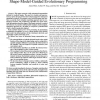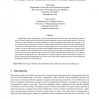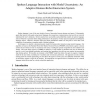530 search results - page 76 / 106 » Learning Bounds for Domain Adaptation |
KI
2002
Springer
13 years 9 months ago
2002
Springer
While empirical evaluations are a common research method in some areas of Artificial Intelligence (AI), others still neglect this approach. This article outlines both the opportun...
TMI
2002
13 years 9 months ago
2002
This paper presents a fully automated segmentation method for medical images. The goal is to localize and parameterize a variety of types of structure in these images for subsequen...
AAMAS
2007
Springer
13 years 10 months ago
2007
Springer
Sophisticated agents operating in open environments must make decisions that efficiently trade off the use of their limited resources between dynamic deliberative actions and dom...
ATAL
2010
Springer
13 years 11 months ago
2010
Springer
Multi-agent learning is a crucial method to control or find solutions for systems, in which more than one entity needs to be adaptive. In today's interconnected world, such s...
CONNECTION
2008
13 years 10 months ago
2008
Spoken language is one of the most intuitive forms of interaction between humans and agents. Unfortunately, agents that interact with people using natural language often experienc...



